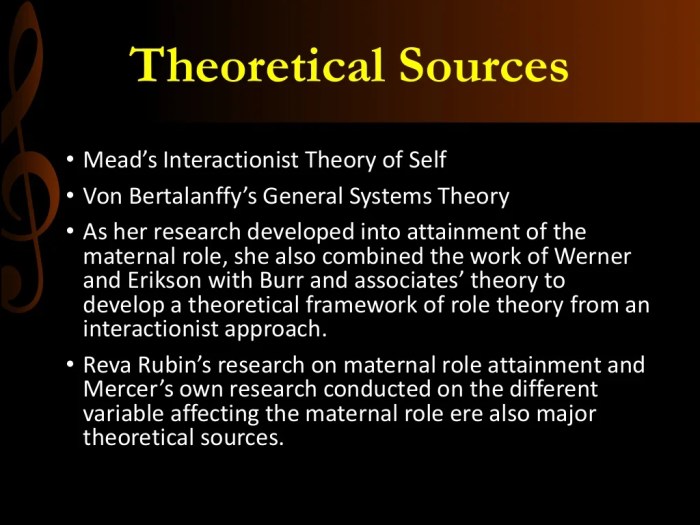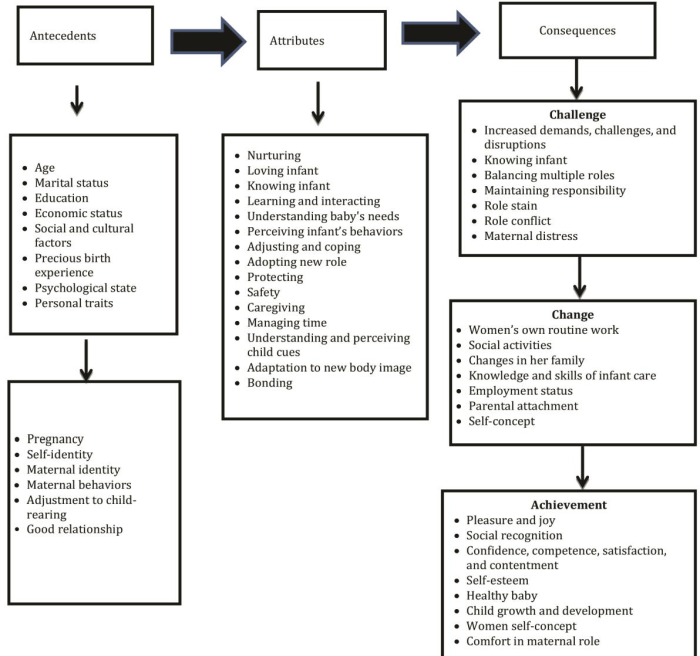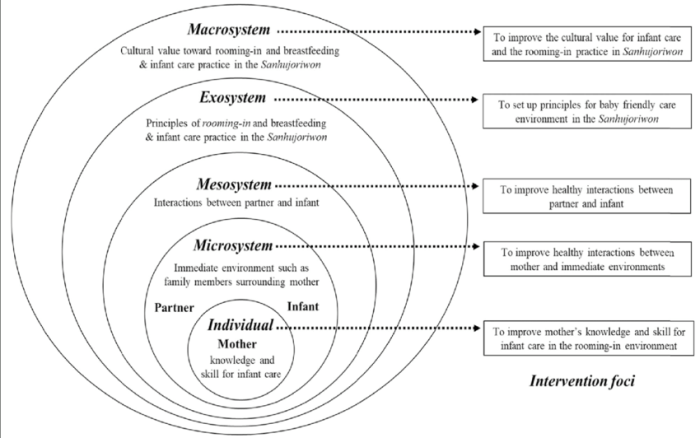Mercer’s Maternal Role Attainment Theory has revolutionized our understanding of the complexities of motherhood. This theory provides a comprehensive framework for understanding how women transition into and navigate the maternal role, offering invaluable insights for healthcare professionals and policymakers alike.
The theory emphasizes the significance of the anticipatory, formal, and informal stages of maternal role attainment, highlighting the interplay between personal, social, and cultural factors that influence a woman’s journey into motherhood.
Overview of Mercer’s Maternal Role Attainment Theory
Mercer’s Maternal Role Attainment Theory is a framework that describes the process by which women transition into the maternal role. The theory was developed by Ruth Mercer in the 1980s and has since become a widely recognized model for understanding the experiences of new mothers.
The theory is based on the idea that becoming a mother is a complex and multifaceted process that involves both physical and psychological changes. Mercer’s theory proposes that women progress through three distinct stages of maternal role attainment: anticipatory, formal, and informal.
The anticipatory stage begins during pregnancy and is characterized by a woman’s anticipation and preparation for the maternal role. The formal stage begins with the birth of the baby and involves the woman’s initial adjustment to motherhood. The informal stage begins when the woman feels comfortable and confident in her maternal role.
Mercer’s theory has been influential in the field of maternal health, as it provides a framework for understanding the experiences of new mothers and identifying factors that can influence their transition into the maternal role.
Key Components of the Theory: Mercer’s Maternal Role Attainment Theory

Mercer’s Maternal Role Attainment Theory consists of three key components: the three stages of maternal role attainment, the factors that influence a woman’s progression through these stages, and the outcomes of maternal role attainment.
The three stages of maternal role attainment are the anticipatory stage, the formal stage, and the informal stage.
The anticipatory stage begins during pregnancy and is characterized by a woman’s anticipation and preparation for the maternal role. During this stage, a woman may experience a range of emotions, including excitement, anxiety, and uncertainty. She may also begin to make changes to her lifestyle and environment in preparation for the arrival of her baby.
The formal stage begins with the birth of the baby and involves the woman’s initial adjustment to motherhood. During this stage, a woman may experience a range of physical and emotional challenges, including fatigue, pain, and mood swings. She may also need to make significant changes to her daily routine to care for her newborn baby.
The informal stage begins when the woman feels comfortable and confident in her maternal role. During this stage, a woman may experience a sense of fulfillment and satisfaction from her role as a mother. She may also develop a strong bond with her baby and feel more confident in her ability to care for her child.
The factors that influence a woman’s progression through these stages include her personal characteristics, her social support network, and her cultural context.
Personal characteristics that can influence maternal role attainment include a woman’s age, education level, and socioeconomic status. Social support networks that can influence maternal role attainment include a woman’s partner, family, and friends. Cultural context can also influence maternal role attainment, as different cultures have different expectations and norms for mothers.
The outcomes of maternal role attainment can include a woman’s physical and mental health, her relationship with her child, and her overall well-being.
Application of the Theory

Mercer’s Maternal Role Attainment Theory has been used to understand a variety of maternal experiences, including the transition to motherhood, the experience of breastfeeding, and the impact of maternal role on a woman’s mental health.
Research studies that have utilized the theory have found that it can be a useful framework for understanding the experiences of new mothers and identifying factors that can influence their transition into the maternal role.
For example, one study found that women who had higher levels of social support were more likely to progress through the stages of maternal role attainment more quickly and experience more positive outcomes.
Another study found that women who had a history of depression were more likely to experience challenges during the transition to motherhood and were more likely to experience negative outcomes.
The theory has also been used to develop interventions to support women during the transition to motherhood.
For example, one intervention that was based on the theory was found to be effective in reducing the risk of postpartum depression and improving maternal role attainment.
Mercer’s Maternal Role Attainment Theory has also been used to inform policy decisions.
For example, the theory has been used to develop policies that support breastfeeding and provide paid maternity leave.
Critique and Refinement of the Theory
Mercer’s Maternal Role Attainment Theory has been criticized for being too linear and for not taking into account the diversity of maternal experiences.
For example, some critics have argued that the theory does not adequately account for the experiences of women who do not experience a traditional pregnancy or birth or who do not have a supportive social network.
Other critics have argued that the theory does not take into account the role of fathers and other caregivers in the maternal role.
In response to these criticisms, Mercer has revised the theory over time to make it more inclusive and to take into account the diversity of maternal experiences.
For example, Mercer has added a fourth stage to the theory, the continuing maternal role stage, which recognizes that the maternal role is a lifelong process that continues to evolve as a woman’s child grows and develops.
Mercer has also revised the theory to take into account the role of fathers and other caregivers in the maternal role.
Despite these revisions, the theory continues to be criticized for being too narrow and for not taking into account the full range of maternal experiences.
Case Study Analysis

A 25-year-old woman named Sarah is a first-time mother who is struggling to adjust to her new role.
Sarah is experiencing a range of challenges, including fatigue, sleep deprivation, and difficulty breastfeeding.
She is also feeling overwhelmed and isolated, as she does not have a strong support network.
Sarah’s experience can be analyzed using Mercer’s Maternal Role Attainment Theory.
Sarah is currently in the formal stage of maternal role attainment.
She is experiencing a range of challenges that are common during this stage, including fatigue, sleep deprivation, and difficulty breastfeeding.
Sarah is also feeling overwhelmed and isolated, which is likely due to her lack of a strong support network.
Based on Mercer’s theory, there are a number of interventions that could be used to support Sarah.
These interventions could include providing Sarah with education and support on breastfeeding, helping her to develop a support network, and providing her with respite care.
By providing Sarah with these interventions, it is likely that she would be able to progress more smoothly through the stages of maternal role attainment and experience more positive outcomes.
Helpful Answers
What are the key components of Mercer’s Maternal Role Attainment Theory?
The theory consists of three stages: anticipatory, formal, and informal, which describe the progressive transition into the maternal role.
How can healthcare professionals apply this theory in practice?
By understanding the factors influencing maternal role attainment, healthcare professionals can provide targeted support, education, and interventions to facilitate a smooth transition for women.
What are the strengths and limitations of Mercer’s theory?
Strengths include its comprehensive nature and emphasis on individual experiences. Limitations include its focus on first-time mothers and the need for further research on diverse populations.